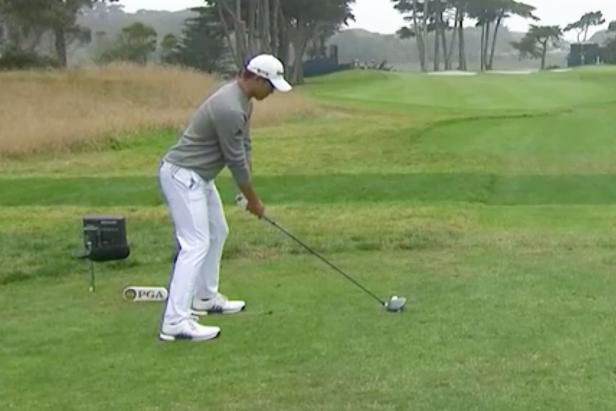Products You May Like
In just a moment, we’ll contextualize “The Drive” in more concrete, analytical terms, but first, your author would like to share a short exchange between a dozen golf fans who were following Sunday’s drama at the PGA Championship in an online chat room. While names have been removed to protect the innocent, lunatic typos have been left in place. We pick it up from the moment before Collin Morikawa teed it up on the short par-4 16 at TPC Harding Park:
if he gets on the green here, that might be tourney
holy ****
MOARRRRRRRRIKAWA
shut ti down
morikawa comin in HOTTTTT
shut it the **** down
this is done
Kid deserves to win
My gawd
ballgame?
what a ****ing crack
We transcribed that exchange to show the pure joy/awe/excitement that the eventual champ’s shot inspired, because that’s an important element to keep in mind before diving into the technical stuff. If you’re on Twitter, you saw the same dynamic play out. It was a true jaw-dropper, and even Paul Casey, fighting for his first major, had to stop and admire the result from his perch on the 17th tee. Frank Nobilo rose to the moment on CBS: “It’s brilliant, Nick. It’s brilliant! Absolutely brilliant. That is what we’ve been waiting for. Twenty-three years of age … the shot of his life!”
It’s easy to say this kind of thing in hindsight, but Morikawa won the tournament with that shot. Yes, a few strange things could have happened the next few holes (Jean Van de Velde happened, after all), but it was such a devastating momentum shift for the rest of the field that it feels correct—if not obvious—to say this was the definitive moment of the tournament. It was even a terrific showcase for Toptracer—being able to witness the gentle, perfect fade with the aid of the red parabola highlighted the bold genius of the strike, and lent it a certain destiny. Even a day later, it is eminently re-watchable.
But let’s come back down to earth. When we ask the question posed in the title—is this the greatest shot in PGA Championship history?—we have to sidestep the landmine of recency bias. Clearly, we might be victims of this, so let’s delve into the objective world of numbers.
Data from the PGA Tour’s tracker2 data shows that Morikawa achieved a massive 1.21 strokes gained just from that single shot. That makes it his single best shot of the event, besting his 38-foot birdie putt on No. 11 Friday, but that conclusion feels pretty drab. Duh, of course it is.
Then again, it’s actually pretty profound, because you can’t divorce the feat from the stakes. This was a 23-year-old (an extremely polished 23-year-old, but still) playing in his first PGA Championship, and experiencing the nerves of being in contention at a major for the first time in his life. Standing before a risk/reward hole, tied for the lead with Paul Casey, he was facing a difficult shot under the best of circumstances (only 17 of 73 players who attempted to drive the green Sunday were successful). With the weight of history on him, even a “good” shot would have been stunning. To hit the best shot of his entire week, in those conditions, is just this side of absurd.
In fact, as the PGA Tour’s Shotlink graphics coordinator Luis Rivera told me, he had the second-best shot off the tee of any player all day … on any hole. Denny McCarthy, far out of contention, hit his tee shot on 16 to two feet, but beyond that, nobody touched Morikawa.
Along with the pressure aspect, you can’t divorce his feat from the way it completely shifted the momentum of the tournament. All day, the players at the top of the leader board clustered together, with nobody breaking away from the pack. Tenuous one-shot leads were the most breathing room anyone could muster, and Morikawa himself was an afterthought until he chipped in on 14. Then, with one swing of the club, everything changed. This might sound melodramatic, but he basically brought the entire field to its knees, and—again, hindsight is 20/20 etc. etc.—won the tournament with a shot.
But in order to call it the greatest shot in PGA Championship history, we need to introduce that last critical element: History. To compare what Morikawa accomplished with great shots of the past, we brought in Bob Denney, PGA of America historian and all-around smart guy. Denney collaborated on our list of the 15 best PGA Championships earlier this year, and if anyone could put Morikawa’s drive into context, it was him. So we asked the question to him directly: Was this the g.o.a.t.?
“Well, based on the stakes,” Denney said, “it ranked, for me, in the top three.”
Hearing that from a student of the game was a relief, and as it turned out, Denney was no less bullish on Morikawa than the most rabid Twitter partisans.
“It signals to me a new era in the game,” he said. “It shows the quality of play coming out of the college ranks, and I just believe this young man’s mental toughness, right behind that beautiful smile of his, is solid. He’s 23, and it almost seemed like he was 43, the way he managed that golf course.”
Denney compared him to Jack Nicklaus in terms of his intelligence, but when it came time to put his drive up against the greatest single shots in championship history, he had three other golfers in mind.
(For those curious about Shaun Micheel’s approach shot at the 2003 PGA, recall that he was already up by a stroke at the time, so the kick-in birdie, while impressive, did not clinch victory.)
We refrained from forcing Denney to rank them, because it’s validation enough that he thinks Morikawa’s shot belongs in this exalted company. Tway’s walk-off was more dramatic, but luckier. Player’s approach is more visually dramatic, but less of a clear momentum shift. Sarazen’s has the feel of legend, but is shrouded in the fog of history.
There’s no clear hierarchy here, and the great thing is, there doesn’t have to be. What Morikawa accomplished on 16 will live on in golf history. Is it the best shot ever at a PGA Championship? There’s an argument, which means that the answer is “yes” if you want it to be. And in this moment, in August 2020, who doesn’t?


